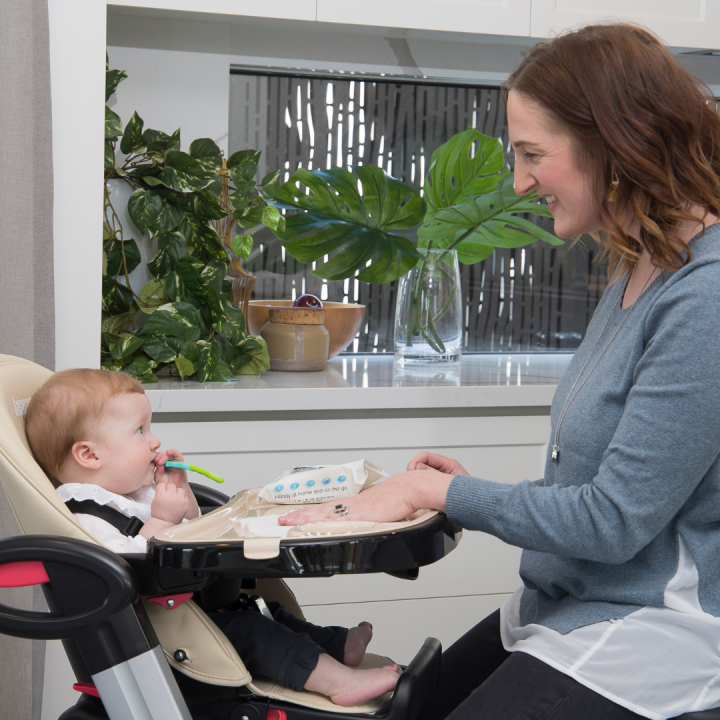How to reduce the risk of your baby developing food allergies

Currently in Australia, it’s estimated that around 10% of babies have a food allergy. Most will outgrow allergies over time, though a small percentage of children will have lifelong allergies.
Current research supports introducing even potentially allergenic foods when babies are developmentally ready and in the first year of life. This includes peanut butter, cooked eggs, soy milk, dairy and wheat products. Even babies with a high risk of allergy should be give ‘allergenic’ foods.
During pregnancy
Experts recommend that pregnant women eat a healthy and balanced diet. There is no benefit in excluding any particular foods, including those which are thought to be highly allergenic.
Up to three serves of oily fish per week may be helpful and protective. Omega-3 fatty acids in fish may help to prevent eczema later in life.
Although probiotics during pregnancy (and breastfeeding) may help with eczema prevention, what’s not yet clear is the exact dose.
How would I know if my baby is allergic?
You may suspect your baby has an allergy if they have any of these reactions:
- Rashes
- Vomiting
- Hives or welts on their skin
- Swelling of their eyes, face or lips
- A significant itch
- A tingling mouth
If your baby has any of these reactions, stop giving them the food and watch them closely. Always have your baby checked by a doctor if they have an allergic reaction to food (of other substances). Sometimes a referral to a paediatric allergist is needed to work out a feeding and treatment plan.
What’s anaphylaxis?
Anaphylaxis is a serious, life-threatening allergic reaction. It involves the immune system and triggers reactions in breathing and heart functions. Allergic reactions generally involve the skin.
When a person has anaphylaxis, they don’t have enough adrenaline in their body to reverse the body’s reaction. This is why the immediate treatment for anaphylaxis is to have a shot of adrenaline, generally from an EpiPen which is an auto-injector containing adrenaline.
Feeding advise for solid foods
- Breastfeed your baby, if possible, for at least six months or for as long as you’re both happy to continue. Breastfeeding may be protective against allergies developing, though the evidence around this is low.
- If you aren’t breastfeeding, feed your baby a standards cow’s milk-based formula. There is no evidence that soy or goat’s milk formula reduces the risk of allergies.
- Introduce solid foods at around six months, but not before four months and when your baby is developmentally ready.
- Offer your baby iron rich foods. Most babies can eat any food in any order and combination. What’s important is that they have nutritious foods when they are ready.
- Cow’s milk or soy milk and their products, can be used in cooking, or with other foods if dairy and soy products don’t cause a reaction.
- Aim to feed your baby a family diet, the same food as the rest of the family is eating when they are ready.
- Unless your baby has had an allergic reaction to a particular food, regularly offer the same food a couple of times each week. Food allergies may result from babies trying a new food and then not having it regularly.
- Even if there is a family history of egg allergy, there can be benefits in babies eating cooked egg before eight months of age. If you have other family members who are allergic to egg, it’s important to be particularly careful about their potential exposure.
- Introduce one new common allergen food at a time. This will help to confirm the problem food if your baby has an allergic reaction.
- If your baby does have an allergic reaction, stop giving that food and get medical advice.
For more information about food allergies, check here. Always check with your doctor or baby’s paediatrician if you’re unsure about allergies.
Written for Milton by Jane Barry Midwife and Child Health Nurse, July 2022.
